 Many research reports also clearly show a supply and demand imbalance in the high-end home market due to a fall in demand and increase in supply. (Photo: vneconomy.vn)
Many research reports also clearly show a supply and demand imbalance in the high-end home market due to a fall in demand and increase in supply. (Photo: vneconomy.vn) HCM City (VNA) - The housing market is facing an oversupply of high-end developments, detracting from the market’s attraction to investors, Minister of Construction Pham Hong Ha has said at a meeting with the Prime Minister’s working group recently.
There is enough luxury housing to last until 2020, he said.
Many research reports also clearly show a supply and demand imbalance in the high-end home market due to a fall in demand and increase in supply.
Some have estimated the inventory at around 200,000 high-end homes in the period from 2011 and 2015, and this figure has now increased significantly.
Another report said in the last three years the market added 50,000-60,000 apartments a year.
Incomplete statistics from the Vietnam Real Estate Association show more than 4,000 projects with a combined area of 460 million square metres, which is equivalent to 3 million apartments.
In HCM City, in 2016 and 2017 the market added over 30,000 housing units, of which high-end homes accounted for 20.3 percent, according to the Ho Chi Minh City Real Estate Association (HoREA).
Market observers said though the supply of luxury housing increased sharply, demand fell accordingly.
According to a Savills Vietnam report, there was a 31 percent decrease in demand for luxury apartments in 2016.
HoREA said in the first two quarters of 2016 sales of apartments in the city, mainly high-end homes, dropped by nearly 45 percent.
Like many other major markets in the country, HCM City is also facing many other problems in addition to the oversupply of high-end apartments, one of which is the shortage of low-cost social and commercial housing.
According to Tran Ngoc Quang, General Secretary of the Vietnam Real Estate Association, in recent years developers have focused on luxury housing while 70 percent of the demand has been in the medium- and low-priced segments.
In recent years investors have vied with each other to invest in the high-end home segment without paying heed to the market demand, expected a significant increase in buying by foreigners and overseas Vietnamese following changes to the ownership laws and policies.
But it has turned out that the number of foreigners and overseas Vietnamese seeking to buy homes in the country is not as high as expected. Besides, some recent changes to credit policies by the State Bank of Vietnam have hit demand from speculators.
Circular No.06 /2016/TT-NHNN, which came into effect on January 1, has raised the risk index from 150 (the lowest level) to 200 percent, making investors worry about a cash crunch.
The circular also specifies a roadmap for the maximum ratio of short-term funds used for medium- and long-term loans to be reduced from 60 percent to 40 percent, which has made the banks cautious about pumping money into the real estate sector.
These are expected to make the lending interest rates less attractive for home buyers, and so many investors do not want to further put money into real estate products, especially luxury ones.
This has resulted in an oversupply of luxury homes, raising the spectre of bad debts as developers struggle to sell.
According to CBRE, in recent times more than 60 percent of apartment buyers are speculators, with the majority depending on bank loans for their funding.
HoREA revealed that loans given for developing and buying property last year were worth around 150 trillion VND, a year-on-year increase of 14.2 percent.
The bad debt ratio in the sector averaged 3.9 percent.-VNA
VNA






















